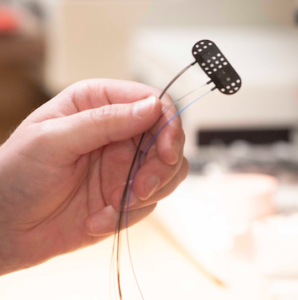 Over the years the Optics team at MGH Martinos Center has developed several fiber optics sensors for both NIRS and DCS. We build all sensors in-house having acquired the necessary tools and are able to keep costs relatively low by buying the components at bulk.
Over the years the Optics team at MGH Martinos Center has developed several fiber optics sensors for both NIRS and DCS. We build all sensors in-house having acquired the necessary tools and are able to keep costs relatively low by buying the components at bulk.
We are constantly building new sensors for our research projects, but have the bandwidth to also serve the fNIRS research community and sell sensors for research use only. The sensors the Martinos Center builds are customized and not available commercially. The equipment used is not readily available in most optics lab and the skill gained by our staff over the years has allowed us to make high quality sensors following optimized procedures.
NIRS and DCS sensors can by purchased via a service agreement with MGH. Contact us if interested.
Below are some example of sensors and prices(shown only direct costs. Please note a 44% indirect cost fee need to be added. 44% is the current indirect cost rate for institutional service agreement with non-profit organizations).
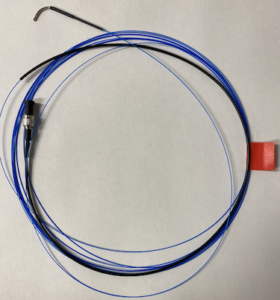 Short separation detector fNIRS fibers:
Short separation detector fNIRS fibers:
One 200um diameter fiber (FT200EMT, other smaller diameter fibers also available), 3 meters long (5m, add +5%), no protective sleeve, terminated with an SMA or FC connector at the device end, and with a 90 deg bend (3 cm) by aluminum tube at subject end.
Source fNIRS fibers compatible with ninja cap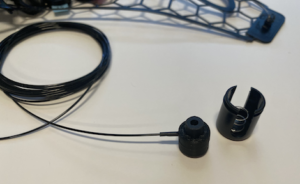
Two 200um diameter fibers ( smaller diameter fibers also available), 3 meters long (5m, add +5%), no protective sleeve, terminated with an SMA or FC connector at the device end, terminated at subject end with prism or mirror, diffuser hosted into a custom plug which fit inside the Ninja cap spring tops (not included).
Variations include DCS source and detector fibers compatible with the spring top. price to be determined.
DCS sensors:
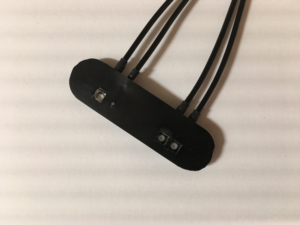 DCS 1 channel: One source MM fiber and 4 co-localized detector SM fibers, 3 m long (5m, add +5%), mesh wire wrap protective sleeve, all fibers FC terminated (SMA available, MTP extra charge) at device, at subject end terminated on a 3D printed flexible plastic sensor with 1 source and 1 detector location, with light directed 90 deg via prisms or mirrors, and diffused to a >1mm spot at the source.
DCS 1 channel: One source MM fiber and 4 co-localized detector SM fibers, 3 m long (5m, add +5%), mesh wire wrap protective sleeve, all fibers FC terminated (SMA available, MTP extra charge) at device, at subject end terminated on a 3D printed flexible plastic sensor with 1 source and 1 detector location, with light directed 90 deg via prisms or mirrors, and diffused to a >1mm spot at the source.
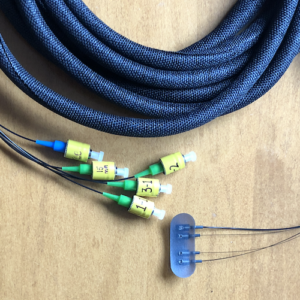 DCS 2 channels: One source MM fiber and 8 detector SM fibers (grouped 4 – 4 or any other combination), 3 m long, mesh wire wrap protective sleeve, all fibers FC terminated at device, at subject end terminated on a 3D printed flexible plastic sensor with 1 source and 2 detector locations, with light directed 90 deg via prisms or mirrors, and diffused on a >1mm spot at the source.
DCS 2 channels: One source MM fiber and 8 detector SM fibers (grouped 4 – 4 or any other combination), 3 m long, mesh wire wrap protective sleeve, all fibers FC terminated at device, at subject end terminated on a 3D printed flexible plastic sensor with 1 source and 2 detector locations, with light directed 90 deg via prisms or mirrors, and diffused on a >1mm spot at the source.
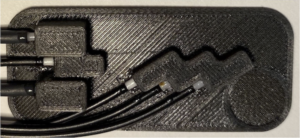 DCS 6 channels: Two sources MM fiber and 12 detector SM fibers (grouped 4 – 4 -4 or any other combination, 7 max in a group), 3 m long, mesh wire wrap protective sleeve, all fibers FC terminated at device, at subject end terminated on a 3D printed
DCS 6 channels: Two sources MM fiber and 12 detector SM fibers (grouped 4 – 4 -4 or any other combination, 7 max in a group), 3 m long, mesh wire wrap protective sleeve, all fibers FC terminated at device, at subject end terminated on a 3D printed
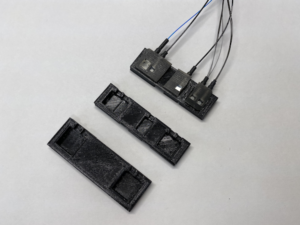
flexible plastic sensor with 2 source and 3 detector locations, with light directed 90 deg via prisms or mirrors, and diffused on a >1mm spot at the sources.
DCS probes with variable source-detector separation are also available
NIRS sensors
NIRS 1 channel 2 colors: two co-localized source MM fibers and one detector 2.5 mm diameter fiber bundle, 3 m long, mesh wire wrap protective sleeve, all fibers SMA terminated at device, at subject end terminated on a 3D printed flexible plastic sensor with 1 source and 1 detector location, with light directed 90 deg via mirrors or prisms, and diffused on a >1mm spot at the source.
NIRS 4 channels 2 colors: two co-localized source MM fibers and four detector 2.5mm diameter fiber bundles, 3 m long, mesh wire wrap protective sleeve, all fibers SMA terminated at device, at subject end terminated on a 3D printed flexible plastic sensor with 1 source location and 4 detector locations, with light directed 90 deg via mirrors or prisms, and diffused on a >1mm spot at the source.
NIRS 4 channels 8 colors: eight source MM fibers to fiber bundle and four detector fiber bundles, 3 m long, mesh wire wrap protective sleeve, all fibers SMA terminated at device, at subject end terminated on a 3D printed flexible plastic sensor with 1 source location and 4 detector locations, with light directed 90 deg via mirrors or prisms, and diffused on a >1mm spot at the source.
Hybrid NIRS-DCS sensors:
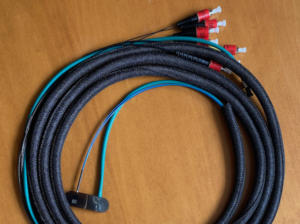 NIRS-DCS 1 channel: source – one DCS MM fiber and 2 NIRS MM fibers co-localized, detector – one NIRS fiber bundle and 4 DCS SM fibers all co-localized, 3 m long, mesh wire wrap protective sleeve, all DCS fibers FC terminated, NIRS fibers SMA terminated at device, at subject end terminated on a 3D printed flexible plastic sensor with 1 source location and 1 detector location, with light directed 90 deg via mirrors or prisms , and diffused on a >1mm spot at the source.
NIRS-DCS 1 channel: source – one DCS MM fiber and 2 NIRS MM fibers co-localized, detector – one NIRS fiber bundle and 4 DCS SM fibers all co-localized, 3 m long, mesh wire wrap protective sleeve, all DCS fibers FC terminated, NIRS fibers SMA terminated at device, at subject end terminated on a 3D printed flexible plastic sensor with 1 source location and 1 detector location, with light directed 90 deg via mirrors or prisms , and diffused on a >1mm spot at the source.
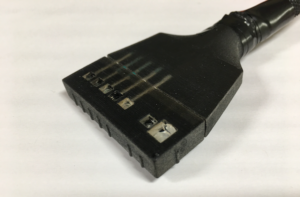 NIRS-DCS 2 channels: source – one DCS MM fiber and 2 NIRS MM fibers co-localized, detectors – two groups of one co-localized NIRS fiber bundle and 4 DCS SM fibers, 3 m long, mesh wire wrap protective sleeve, all DCS fibers FC terminated, NIRS fibers SMA terminated at device, at subject end terminated on a 3D printed flexible plastic sensor with 1 source location and 2 detector locations, with light directed 90 deg via prisms or mirrors, and diffused on a >1mm spot at the source.
NIRS-DCS 2 channels: source – one DCS MM fiber and 2 NIRS MM fibers co-localized, detectors – two groups of one co-localized NIRS fiber bundle and 4 DCS SM fibers, 3 m long, mesh wire wrap protective sleeve, all DCS fibers FC terminated, NIRS fibers SMA terminated at device, at subject end terminated on a 3D printed flexible plastic sensor with 1 source location and 2 detector locations, with light directed 90 deg via prisms or mirrors, and diffused on a >1mm spot at the source.
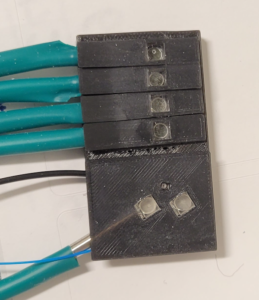 NIRS-DCS 4 channels: sources – two DCS MM fibers and 8 to 1 NIRS fibers not colocalized, detectors – four groups of one colocalized NIRS fiber bundle and 4 DCS SM fibers, 3 m long, mesh wire wrap protective sleeve, all DCS fibers FC terminated, NIRS fibers SMA terminated at device, at subject end terminated on a 3D printed flexible plastic sensor with 3 source locations (2 DCS and 1 NIRS) and 4 NIRS-DCS detector locations, with light directed 90 deg via prisms or mirrors, and diffused on a >1mm spot at the source.
NIRS-DCS 4 channels: sources – two DCS MM fibers and 8 to 1 NIRS fibers not colocalized, detectors – four groups of one colocalized NIRS fiber bundle and 4 DCS SM fibers, 3 m long, mesh wire wrap protective sleeve, all DCS fibers FC terminated, NIRS fibers SMA terminated at device, at subject end terminated on a 3D printed flexible plastic sensor with 3 source locations (2 DCS and 1 NIRS) and 4 NIRS-DCS detector locations, with light directed 90 deg via prisms or mirrors, and diffused on a >1mm spot at the source.
Additional customization is not included and will add to the costs. Custom sensors and fibers different from the ones listed here can be made and costs will be calculated accordingly. Shipping and Repairs costs are not included in the costs.
